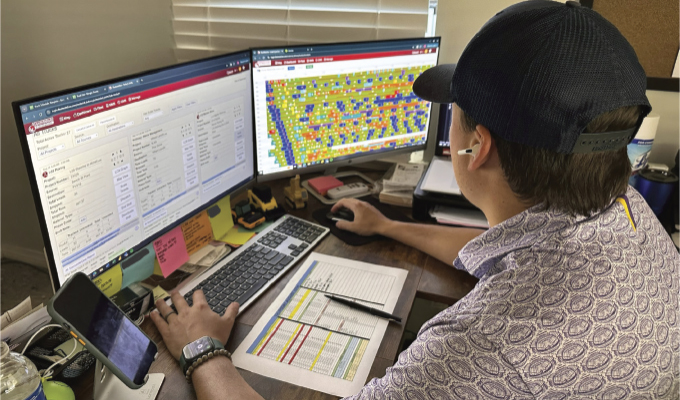When Huey Stockstill Sr. created his construction company in the 1960s, he only had a few employees and one dump truck. However, over time, it soon had significant growth, ultimately leading to over 275 employees, three asphalt plants, seven ready mix plants, two aggregate mining operations, and a large fleet of construction equipment and trucks.
In response, the third-generation company, known today as Huey P Stockstill, LLC (HPS), knew it had to adapt. Its truck lineup was steadily increasing. Its customer base in South Mississippi and South Louisiana was rising exponentially. Therefore, it decided to utilize new technologies, that included FleetWatcher Materials Management Solution (MMS). Seeking to boost its trucks’ efficiency, HPS implemented a pilot project during the summer of 2019.
AN “AHA” MOMENT

The maintenance overlay project called for 40,000 tons of asphalt across Mississippi’s two-lane Highway 90 between Gulfport and Bay St. Louis. Since the highway is heavily traveled, the project was completed at night. HPS initially had tasked 10 to 16 trucks, figuring each truck could cycle the 15 miles from its Gulfport asphalt plant fairly easily. However, Jacob Hickman, asset manager, quickly realized that the project was overtrucked.
By adding FleetWatcher MMS devices to some trucks, HPS discovered that it often had longer hold times than it should have. Despite making quick turns at the plant, trucks were waiting at the jobsite for up to 40 minutes to unload. Therefore, Hickman eventually pulled two trucks from the project and used them to haul other materials.
“When we pulled the two trucks, each truck had an average of one to two loads more than it previously did. We greatly reduced the amount of wait time on the job while still achieving the same amount of tons on the project. The same job was accomplished with fewer trucks, an ‘aha’ moment for us,” says Hickman. “Total time on the jobsite declined from about 1 hour to roughly 20 minutes.”
This increase in efficiency was critical for HPS. First, the company was able to determine what quantity of trucks would offer maximum efficiency and operational profits for each particular job. Second, it increased its confidence for future tasks, including those that utilized multiple trucks for extremely large loads, which is vital for HPS.
Although the company offers asphalt paving, ready mix, mining and aggregate, and site development solutions, its primary scope of work is heavy highway projects, as it conducts many large asphalt contracts. Hence, it must have a more reliable method to determine how many trucks it needs, while striving to complete each large contract as cost effectively, efficiently, and timely as possible.
“Before FleetWatcher, we weren’t being efficient with trucks, but we really couldn’t say with confidence where the inefficiency was. Were we taking too long to load at the plant or too long at a certain job?” says Hickman. “We didn’t have enough trucks for production, and we were having difficulty tracking our trucking cost. Also, we couldn’t calculate our productivity, and we were having difficulty estimating the right number of trucks for a job.”
As a result of FleetWatcher MMS, HPS is no longer overtrucked. The data has been a critical tool to ensure both production is being met and trucks are being utilized efficiently so that the company can move as much material as possible with the fewest trucks. Gone are the days of limited production or arguments with field professionals over how many trucks are necessary for each job. Now HPS has the data it needs to utilize the exact amount of trucks that are required for every specific jobsite, resulting in efficiency increases.
If HPS would like, it may use its additional trucks for other tasks on nearby jobsites, following suit with its pilot project. When necessary, it may also transport the additional trucks from one jobsite to another. In doing so, HPS can quickly acquire the same amount of trucks it previously had on a particular jobsite.
“By using those two extra trucks for other jobs, as we did during the pilot project, we earned money we wouldn’t have otherwise captured,” says Hickman. “As an example, each extra truck we pulled from the pilot project can make $100 an hour for 10 hours each day. That quickly escalates to $20,000 per truck over the life of a 20-day project.”
IF YOU CAN MEASURE IT, YOU CAN MANAGE IT
HPS now uses FleetWatcher MMS on every project, according to Hickman, giving critical, real-time information to field, trucking, and plant personnel. The software aids them by highlighting where the inefficiency is, whether a truck is spending too much time loading at the plant or is waiting too long for the paver. From there, the company can respond accordingly, as FleetWatcher MMS is on each of its trucks, nearly 65 in all.
“If you can measure it, you can manage it. By measuring our trucking, we’ve become much more efficient and saved a significant amount of money,” says Hickman.
Presently, HPS conducts a majority of its hauling with its own trucks. However, this year it has begun to utilize third-party trucks at its Picayune, Mississippi headquarters, primarily due to HPS’s trucking efficiency. Each of these trucks feature FleetWatcher MMS. Consequently, HPS can manage its truck calls, have a much more proactive approach over truck usage, and receive instant feedback, regarding exactly what’s occurring at each jobsite (and why).
“Inspectors can choose whether or not they want to use e-ticketing too, as it’s job-specific. Some want to use it, while others don’t,” says Hickman. “If inpsectors want to see all of the tickets for a particular job, we will provide them access whenever they request it.”
While HPS does not use FleetWatcher to pay its drivers, the company does use it to verify. For example, if a project uses company-owned trucks and third-party vehicles, and HPS employees are reporting very different results than third-party trucks, Hickman will go back and investigate.
HPS integrated FleetWatcher MMS with its scale ticketing system, leading to time savings and consistency, as everyone is using the same data to determine project results and productivity.
“The magic for us is this integration with our scale ticketing system,” says Hickman. “Employees can see all tickets and grab any data they need from our software platform, Samsara, while doing so.”

REFLECTING ON THE PAST, PREPARING FOR THE FUTURE
While reflecting on FleetWatcher MMS’s impact on HPS so far, Hickman has especially noticed its influence on load times. This is particularly critical as HPS encounters a variety of ever-changing, unpredictable factors, such as scheduling changes and traffic.
Of equal importance, it itself offers consistent customer service, in addition to its fleet tracking capabilities and fleet status data offerings, from fuel usages and hour meter readings to rates per mile and temperatures.
“You get to call a person instead of just sending some random email. They’re good about getting back with you and helping you troubleshoot too,” says Hickman.
Upon contemplating the past five years that HPS has utilized FleetWatcher MMS, Hickman believes its experience with the construction fleet management software provider has been very positive overall.
“By looking at our trucking operations, we have really changed the whole way we’ve looked at our business. It has given us the tools we need to challenge ourselves to get better and see our errors. So, for that, we’re very thankful,” says Hickman.
With assistance from FleetWatcher MMS, HPS continues to improve its operations and grow its business, while preparing for its fourth generation of ownership.
FOR MORE INFORMATION
Earthwave Technologies manufactures construction-specific wireless telematic products. FleetWatcher Materials Management Solution (MMS) is being used by asphalt paving contractors across the U.S. To learn more, visit www.fleetwatcher.com.




